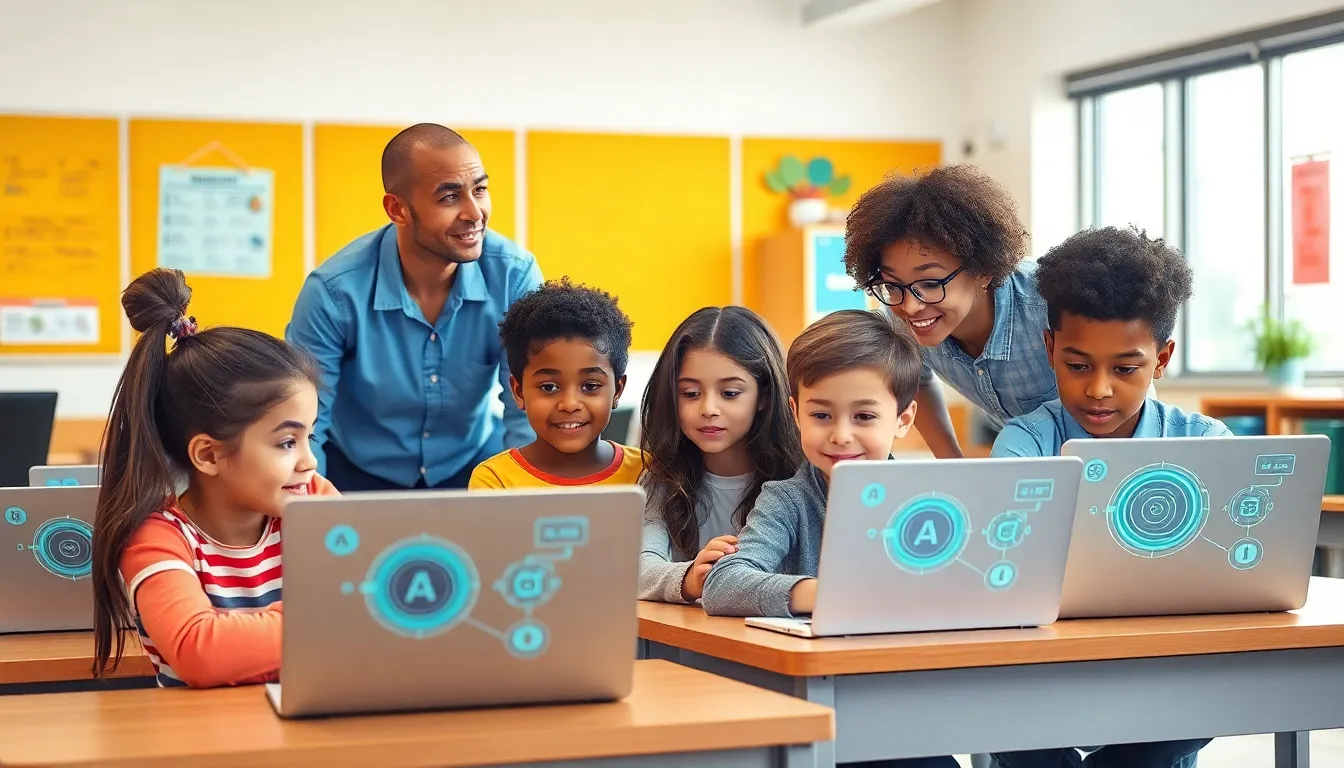In a world where students can’t seem to remember where they left their homework, EdTech AI swoops in like a superhero armed with algorithms. This innovative fusion of education and technology is transforming classrooms into dynamic learning environments. Imagine a virtual assistant that not only grades papers but also tailors lessons to each student’s unique needs—talk about a teacher’s best friend!
Table of Contents
ToggleUnderstanding EdTech AI
EdTech AI revolutionizes education by enhancing learning experiences and optimizing teaching methods. This technology engages students and teachers alike, making classrooms more efficient and interactive.
Definition of EdTech AI
EdTech AI refers to artificial intelligence applications designed for the education sector. These applications analyze data to personalize learning experiences, optimize educational resources, and streamline administrative tasks. They include intelligent tutoring systems, AI-driven assessments, and chatbots. Each of these tools aims to support various aspects of teaching and learning while improving overall educational outcomes.
Importance of EdTech AI in Education
EdTech AI plays a critical role in fostering personalized learning pathways. It helps educators tailor content to fit individual student needs, promoting engagement and effectiveness. Additionally, AI assists teachers by automating administrative tasks such as grading and attendance tracking. This automation allows educators to devote more time to direct interaction with students. Enhanced data analytics offer insights into learning trends, leading to targeted interventions where necessary. By integrating EdTech AI, educational institutions can improve curriculum delivery and maintain a competitive edge in modern education.
Benefits of EdTech AI

EdTech AI provides significant advantages in modern education by enhancing both learning experiences and administrative functions.
Personalized Learning Experiences
Personalized learning experiences become a reality through EdTech AI. Students receive tailored content based on their individual strengths and weaknesses. Adaptive learning algorithms adjust the difficulty of lessons, ensuring each student progresses at a suitable pace. For instance, platforms utilizing AI can recommend specific resources to reinforce concepts that a learner struggles with. Furthermore, real-time analytics empower educators to monitor student engagement and adapt instruction accordingly. This customization fosters a more inclusive learning environment, catering to diverse learning styles and preferences.
Enhanced Administrative Efficiency
Enhanced administrative efficiency marks another key benefit of EdTech AI. AI-driven tools automate time-consuming tasks, such as grading and attendance tracking. Educators can focus more on teaching rather than administrative burdens. Additionally, data-driven insights streamline decision-making processes within educational institutions. By analyzing performance metrics, leaders can identify areas needing improvement, enabling targeted interventions. AI also simplifies administrative workflows, optimizing resource allocation and enhancing communication among staff. This increased efficiency ultimately leads to a more effective educational system, benefiting both teachers and students alike.
Challenges in Implementing EdTech AI
EdTech AI presents several challenges that institutions must navigate for effective implementation. Understanding these obstacles ensures a smoother transition and maximizes the benefits of this technology.
Data Privacy Concerns
Data privacy tops the list of challenges. Educators must handle sensitive student information, which raises significant concerns regarding data security. Schools face compliance with regulations like FERPA and GDPR, demanding stringent data protection measures. Educational institutions must establish clear protocols for data usage to safeguard students’ information. Transparency in data collection and processing builds trust among parents and students. Ignoring these privacy issues could lead to legal repercussions, making proactive measures essential.
Teacher and Student Acceptance
Acceptance from both teachers and students influences the successful integration of EdTech AI. Some educators may resist adopting new technologies due to concerns about replacement or lack of training. Providing comprehensive professional development fosters confidence among teachers in utilizing AI tools. Students also play a critical role; their willingness to engage with technology impacts its effectiveness. Incorporating student feedback into implementation strategies encourages buy-in and adoption. Ensuring that AI complements the educational experience rather than detracts from it is crucial for widespread acceptance.
Future Trends in EdTech AI
EdTech AI continues to evolve, incorporating advanced technologies to transform learning environments. Innovations in predictive analytics and AI-powered learning platforms are changing educational approaches.
Predictive Analytics in Education
Predictive analytics enhances decision-making by leveraging data to anticipate student needs. Educators can identify at-risk students, flagging them for additional support before they struggle. By analyzing patterns in student performance, institutions can tailor interventions precisely when needed. Customizing content and instructional strategies boosts student engagement and success rates. Furthermore, systems using predictive analytics can facilitate resource allocation efficiently, enabling schools to focus their efforts where they matter most.
AI-Powered Learning Platforms
AI-powered learning platforms revolutionize how students interact with content. These systems adapt to individual learning styles, creating personalized experiences for each student. By utilizing real-time feedback, they adjust lesson difficulty and provide targeted resources, ensuring all students progress at their own pace. Such platforms also integrate gamification, increasing motivation and making learning enjoyable. Educators harness these tools to create more dynamic and effective classrooms, enriching the educational experience through personalized engagement.
EdTech AI is reshaping the educational landscape by providing innovative solutions that enhance learning and teaching experiences. As technology continues to evolve, its potential to create personalized pathways for students becomes increasingly significant. With the right implementation strategies, educators can maximize the benefits of AI while addressing challenges like data privacy and user acceptance.
The future of EdTech AI looks promising as predictive analytics and AI-powered platforms become more prevalent. These advancements not only improve student engagement but also streamline administrative tasks, allowing educators to focus on what truly matters—effective teaching. Embracing this technology is essential for educational institutions aiming to stay competitive and foster an inclusive learning environment.










